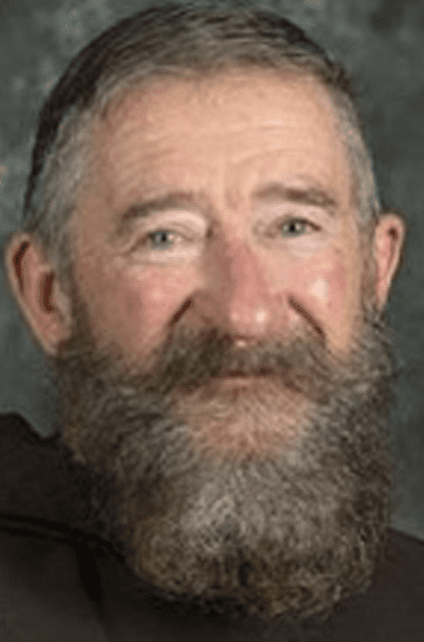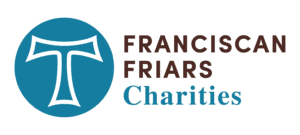
Fr. Conrad Targonski, OFM, is a retired Marine, willing to recount old war stories. But he’s a doer as well.
The friar, 76, is chaplain at Viterbo University in La Crosse, Wisconsin. Besides his duties on campus, he is involved in the wider community. When the subject of homelessness in the city was bandied about in discussions, Fr. Conrad decided action was better than talk.
He volunteered for a local project assisting the unsheltered. Among them was a man who lived in the woods, a Navy vet. Fr. Conrad came out to meet him, dressed in full Franciscan brown habit, carrying the Eucharist.
Fr. Conrad shared a bond with a fellow vet who found that coming home is not easy. He brought his experience of war to the man in the woods as well as the Divine Presence in the Eucharist.
“All of us have been there, Jesus showing his wounds after Easter,” he said about what it was like to minister to a forsaken and forgotten vet.
The experience of being a military chaplain is something Fr. Conrad brings with him everywhere. As a chaplain, he ministered to sailors and Marines around the world, aboard ships and on land with Marines in South Korea, Australia and in Iraq, where he experienced being with those who perished in the battle for Fallujah in 2004.
More than 100 coalition fighters were killed in the battle. As a Franciscan, Fr. Conrad found himself following in the footsteps of Francis of Assisi, whose war wounds from medieval battles were transformed into work for the greater glory of God.
Fr. Conrad said he’s found himself better able to understand Francis since returning home. He’s found that he shared a similar experience with the medieval saint.
Francis of Assisi also returned home wounded and scarred from service. Fr. Conrad notes that the Francis story indicates signs of what we now call Post-Traumatic Stress Disorder (PTSD). He’s seen it in himself.
There’s the temptation towards isolation. The unexplained bursts of anger. His fellow friars, when he returned to regular community life upon retirement from the military in 2010, saw the signs as well.
“I was coming from war. Some told me I was different. Some were afraid of me,” Fr. Conrad recalled. “Our bodies come home before our souls. Our goal is to recapture our souls,” he said.
Fr. Conrad has recaptured his soul by absorbing himself in Franciscan service and community. He meets regularly with vets around La Crosse, which has some 30,000 former service members in the area. He organizes retreats at Franciscan centers around the nation, including California, Arizona and Ohio. And he assists in trips by veterans following in the footsteps of Francis, encouraging both Catholics and non-Catholics with war experiences to see themselves in the struggles of the famous Italian saint.
The message is clear. “He was one of us,” Fr. Conrad says about Francis, who suffered not only physical wounds in service to Assisi but also psychic damage from being held hostage.
The military experience that shaped Fr. Conrad’s ministry came about by happenstance. Fr. Conrad prefers to see it as the invitation of the Spirit.
He’s always been athletic, having run six marathons. One day in the early 1980s, while running around downtown Milwaukee, he came across a recruiting station where Marines were performing drills. He found himself absorbed with all the activity.
A recruiter, aware that the service needed Catholic chaplains, found out his vocation and offered an invitation. Fr. Conrad received permission from his superiors and went off on adventures and struggles he never could have imagined.
“I should have said no,” Fr. Conrad recalls. “But there was something pushing me.” His spiritual advisor at the time told him that “maybe the Lord is taking you to a ministry. I thought that maybe this was where God wanted me to be.”
He joined the Reserves, went into the field with Marines, and found he loved the experience. He signed up for three years. Then that extended to six, nine, and eventually to 22 years of service.
As he grew as a Marine chaplain, his spiritual insights expanded. Fr. Conrad began to study the Bible anew, noting that so much of it involved stories of competing armies. Like the Marines he ministered to, he began to feel Jesus’ approach to ministry as being called to where you are needed, leaving behind everything.
His own experience in combat, tending to the needs of Marines in the Iraq War, resulted in intense encounters once he returned home and was able to reflect upon his experiences. Reading a Gospel passage he read in Fallujah can bring him to tears. Visiting the gravesite of a Marine who died saving fellow Marines brought him to anguish.
“Iraq became a defining moment for me in my vocation,” he said. It was an experience difficult to talk about. He remembered being with a Navy psychiatrist, another kind of helper for Marines, and wondering, “Who do we talk to?”
He’s brought with him a Franciscan vision galvanized by wartime experience. He confessed to feeling distracted during prayer. But when he visited the cross at San Damiano, the chapel made famous by Francis, he prayed for hours in total intensity.
“I was completely still. I was looking at the cross with the same eyes Francis had when he came back from war. I felt simpatico,” he said.
The decision to become a military chaplain did raise concerns in some quarters. What’s a Franciscan to do isolated from his friar community? And wasn’t Francis about peace, not waging war?
Fr. Conrad looks at it differently. The man from Assisi’s veteran experience was not a sidelight, something left far behind after the saint’s conversion. It was integral to his vision of peace and encountering the Spirit. It took Francis time to recover from his physical and psychic wounds, but that process of healing created the outreach that would later become famous. Fr. Conrad seems himself and the veterans he ministers to in a similar light.
“If Francis had not gone to war, would we have what we have today?” he asked.

